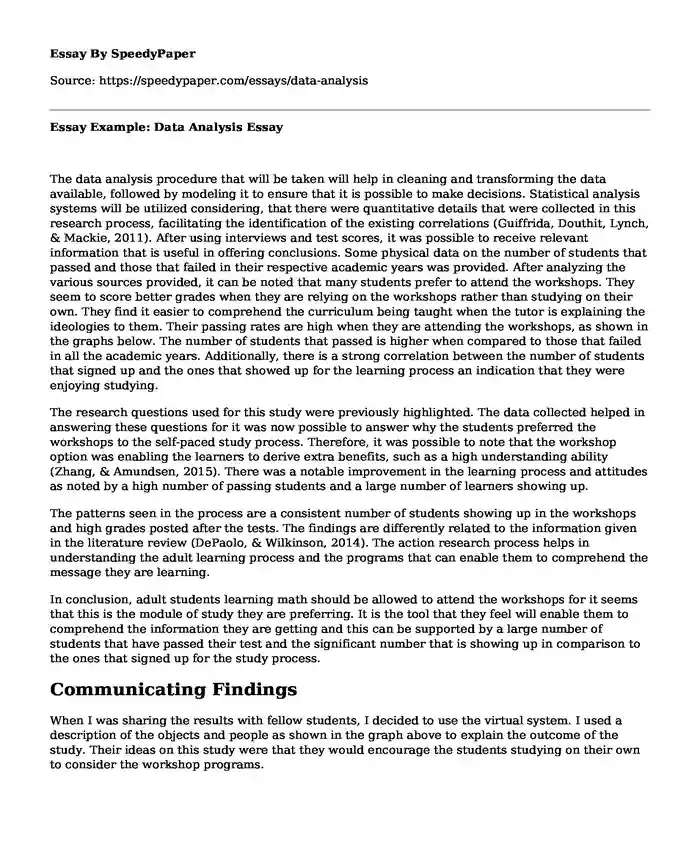
| Type of paper: | Course work |
| Categories: | Students Data analysis Research |
| Pages: | 3 |
| Wordcount: | 767 words |
The data analysis procedure that will be taken will help in cleaning and transforming the data available, followed by modeling it to ensure that it is possible to make decisions. Statistical analysis systems will be utilized considering, that there were quantitative details that were collected in this research process, facilitating the identification of the existing correlations (Guiffrida, Douthit, Lynch, & Mackie, 2011). After using interviews and test scores, it was possible to receive relevant information that is useful in offering conclusions. Some physical data on the number of students that passed and those that failed in their respective academic years was provided. After analyzing the various sources provided, it can be noted that many students prefer to attend the workshops. They seem to score better grades when they are relying on the workshops rather than studying on their own. They find it easier to comprehend the curriculum being taught when the tutor is explaining the ideologies to them. Their passing rates are high when they are attending the workshops, as shown in the graphs below. The number of students that passed is higher when compared to those that failed in all the academic years. Additionally, there is a strong correlation between the number of students that signed up and the ones that showed up for the learning process an indication that they were enjoying studying.
The research questions used for this study were previously highlighted. The data collected helped in answering these questions for it was now possible to answer why the students preferred the workshops to the self-paced study process. Therefore, it was possible to note that the workshop option was enabling the learners to derive extra benefits, such as a high understanding ability (Zhang, & Amundsen, 2015). There was a notable improvement in the learning process and attitudes as noted by a high number of passing students and a large number of learners showing up.
The patterns seen in the process are a consistent number of students showing up in the workshops and high grades posted after the tests. The findings are differently related to the information given in the literature review (DePaolo, & Wilkinson, 2014). The action research process helps in understanding the adult learning process and the programs that can enable them to comprehend the message they are learning.
In conclusion, adult students learning math should be allowed to attend the workshops for it seems that this is the module of study they are preferring. It is the tool that they feel will enable them to comprehend the information they are getting and this can be supported by a large number of students that have passed their test and the significant number that is showing up in comparison to the ones that signed up for the study process.
Communicating Findings
When I was sharing the results with fellow students, I decided to use the virtual system. I used a description of the objects and people as shown in the graph above to explain the outcome of the study. Their ideas on this study were that they would encourage the students studying on their own to consider the workshop programs.
Future Action
The next step that I will take is to introduce these finds to the institutions that are training adult students. I will recommend them to consider the workshops programs for their students to realize positive outcomes (Wilson-Doenges, 2013). An issue that I would do differently is incorporate questions on whether there are other factors apart from the learning environment that facilitated the posting of the good grades. Through the incorporation of this information, I will manage to know whether the workshops was the only factor that supported a rise in the number of students that passed. The research will promote the desire to follow programs that will enable students to pass their exams.
References
DePaolo, C. A., & Wilkinson, K. (2014). Get your head into the clouds: Using word clouds for analyzing qualitative assessment data. TechTrends, 58(3), 38-44. Retrieved from https://www.researchgate.net/profile/Concetta_Depaolo/publication/272016699_Get_Your_Head_into_the_Clouds_Using_Word_Clouds_for_Analyzing_Qualitative_Assessment_Data/links/5867e1a608ae329d620dfb33/Get-Your-Head-into-the-Clouds-Using-Word-Clouds-for-Analyzing-Qualitative-Assessment-Data.pdf
Guiffrida, D. A., Douthit, K. Z., Lynch, M. F., & Mackie, K. L. (2011). Publishing action research in counseling journals. Journal of Counseling & Development, 89(3), 282-287. Retrieved fromdoi.org/10.1002/j.1556-6678.2011.tb00090.x
Wilson-Doenges, G. (2013). Statistical Models for Analyzing Learning Data. New Directions for Teaching and Learning, 136, 49-58. Retrieved from https://eric.ed.gov/?id=EJ1029369
Zhang, Q., & Amundsen, C. (2015). Exploring the Experiences of Faculty-Led Teams in Conducting Action Research. Canadian Journal for the Scholarship of Teaching and Learning, 6(1), 8. doi.org/10.5206/cjsotl-rcacea.2015.1.8
Cite this page
Essay Example: Data Analysis. (2023, Mar 27). Retrieved from https://speedypaper.net/essays/data-analysis
Request Removal
If you are the original author of this essay and no longer wish to have it published on the SpeedyPaper website, please click below to request its removal:
- Cleanliness and Culture - The Article Essay Sample
- Egyptian Uprising in Our Free Essay Example
- Business Essay Sample on Differentiation and Low-Cost Strategies
- Free Essay Sample about Fracking in the U.S.
- Essay Sample Analyzing Special Education Legislation
- Essay Example on Barack Obama: The Master Orator
- Oil Spill Bioremediation Laboratory - Free Essay
Popular categories




